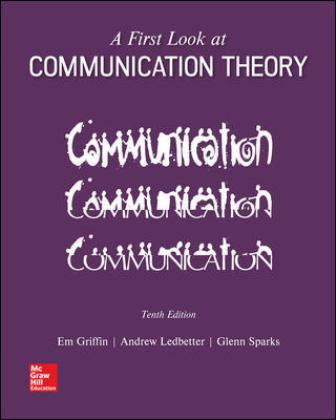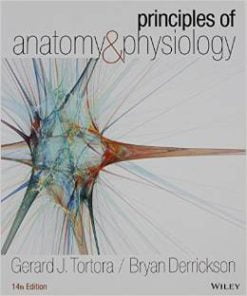Test Bank for A First Look at Communication Theory 10th Edition Griffin
$35.00 Original price was: $35.00.$26.50Current price is: $26.50.
Test Bank for A First Look at Communication Theory 10th Edition Griffin
Test Bank for A First Look at Communication Theory, 10th Edition, By Em Griffin, Andrew Ledbetter, Glenn Sparks

Product details:
- ISBN-10 : 1259913783
- ISBN-13 : 978-1259913785
- Author: Andrew Ledbetter
The tenth edition of A First Look at Communication Theory justifies again the program’s enduring popularity. Em Griffin, now joined by colleagues Andrew Ledbetter and Glenn Sparks, encourages students who are encountering the field for the first time to tackle theories without fear. The text’s conversational style and relevant examples keep complex theories within the grasp of first-time theory students. The authors introduce 32 diverse theories that are a mix of foundational and recent scholarship and, with the benefit of numerous examples and connections to pop culture, help students apply them to their own lives. The discrete presentation of the theories ensures a well-rounded understanding of each while promoting integrative thinking and facilitating the ability of instructors to skip or rearrange their presentation. The broad selection of theories-from the classics to the cutting edge-ensures that students have a solid foundation with which to begin understanding the relationships between theories.
New to This Edition●Responding to instructors’ desire to offer students more than one social media theory, a new chapter highlights Caroline Hawthornthwaite’s media multiplexity theory.●A new chapter features Marc Orbe’s co-cultural theory, which is based on extensive phenomenological research among the LGBTQ community, people with physical disabilities, and African American men. ●The discussion of relational dialectics theory has been fully updated to center on Baxter’s second version of the theory, which draws heavily on the thinking of Mikhail Bahktin.●Updated examples will appeal to current students, including the illustration of social judgment theory with the issue of gun control rather than airline safety. ●A revised critique of social information processing theory cites MIT professor Sherry Turkle’s challenge to Walther’s basic claim that anything we do face-to-face can be done just as well or better online.●Cultural studies now includes Larry Frey’s appeal for communicative activism for social justice. This is the only ethical reflection in the book highlighting an ethicist currently active in the field of communication.●Based on updated research, the presentation of face-negotiation theory has been simplified.●End-of-chapter Critique sections are sharpened.
Table of Contents
Griffin: A First Look at Communication Theory, 10e – Test Bank
CHAPTER 1: Launching Your Study of Communication Theory
CHAPTER 2: Talk About Theory
CHAPTER 3: Weighing the Words
CHAPTER 4: Mapping the Territory (Seven Traditions in the Field of Communication Theory)
CHAPTER 5: Symbolic Interactionism of George Herbert Mead
CHAPTER 6: Coordinated Management of Meaning (CMM) of W. Barnett Pearce & Vernon Cronen
CHAPTER 7: Expectancy Violations Theory of Judee Burgoon
CHAPTER 8: Social Penetration Theory of Irwin Altman & Dalmas Taylor
CHAPTER 9: Uncertainty Reduction Theory of Charles Berger
CHAPTER 10: Social Information Processing Theory of Joseph Walther
CHAPTER 11: Relational Dialectics of Leslie Baxter & Barbara Montgomery
CHAPTER 12: Communication Privacy Management Theory of Sandra Petronio
CHAPTER 13: Media Multiplexity Theory of Caroline Hawthornthwaite
CHAPTER 14: Social Judgment Theory of Muzafer Sherif
CHAPTER 15: Elaboration Likelihood Model of Richard Petty & John Cacioppo
CHAPTER 16: Cognitive Dissonance Theory of Leon Festinger
CHAPTER 17: Functional Perspective on Group Decision Making of Randy Hirokawa & Dennis Gouran
CHAPTER 18: Symbolic Convergence Theory of Ernest Bormann
CHAPTER 19: Cultural Approach to Organizations of Clifford Geertz & Michael Pacanowsky
CHAPTER 20: Communicative Constitution of Organizations of Robert McPhee
CHAPTER 21: Critical Theory of Communication in Organizations of Stanley Deetz
CHAPTER 22: The Rhetoric of Aristotle
CHAPTER 23: Dramatism of Kenneth Burke
CHAPTER 24: Narrative Paradigm of Walter Fisher
CHAPTER 25: Media Ecology of Marshall McLuhan
CHAPTER 26: Semiotics of Roland Barthes
CHAPTER 27: Cultural Studies of Stuart Hall
CHAPTER 28: Uses and Gratifications of Elihu Katz
CHAPTER 29: Cultivation Theory of George Gerbner
CHAPTER 30: Agenda-Setting Theory of Maxwell McCombs & Donald Shaw
CHAPTER 31: Genderlect Styles of Deborah Tannen
CHAPTER 32: Standpoint Theory of Sandra Harding & Julia Wood
CHAPTER 33: Muted Group Theory of Cheris Kramarae
CHAPTER 34: Communication Accommodation Theory of Howard Giles
CHAPTER 35: Face-Negotiation Theory of Stella Ting-Toomey
CHAPTER 36: Co-Cultural Theory of Mark Orbe
CHAPTER 37: Common Threads in Comm Theories
People also search:
a first look at communication theory 10th edition pdf
griffin a first look at communication theory 10th edition pdf
a first look at communication theory 10th edition citation
a first look at communication theory 10th edition summary











